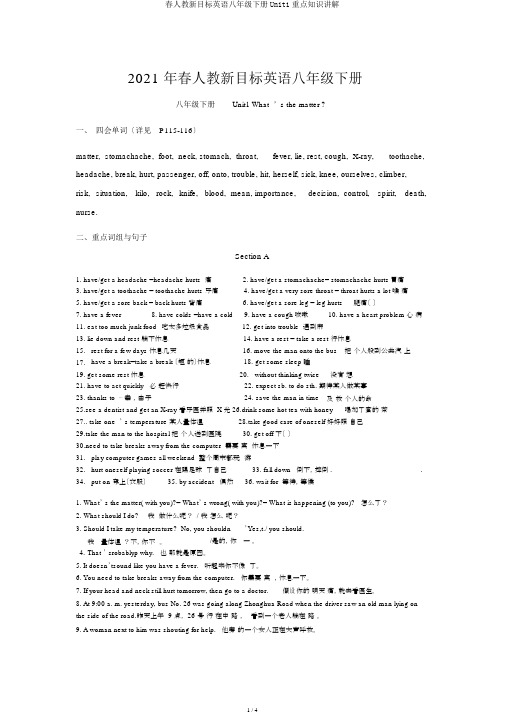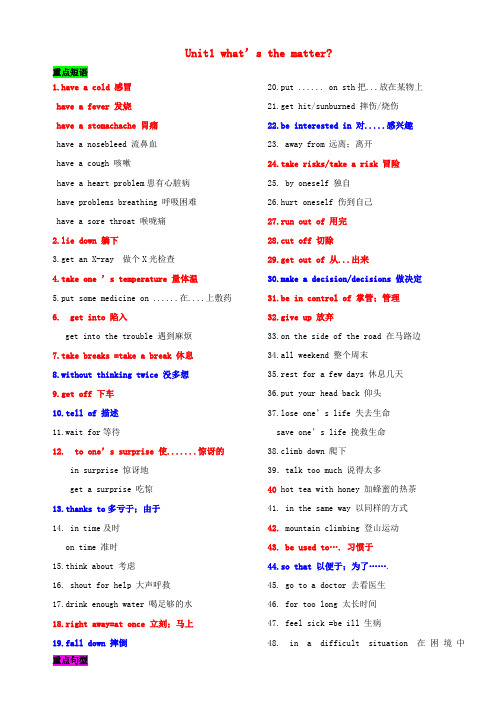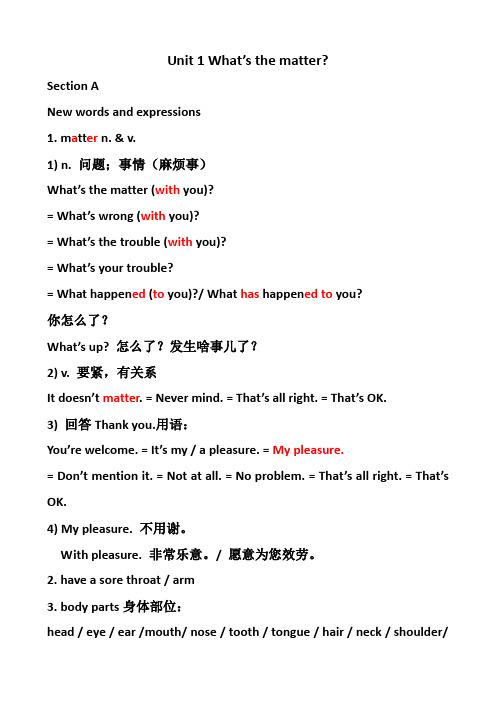8下英语Unit1 基础知识要求背诵
春人教新目标英语八年级下册Unit1重点知识讲解

2021 年春人教新目标英语八年级下册八年级下册Unit1 What ’s the matter ?一、四会单词〔详见P115-116〕matter, stomachache, foot, neck, stomach, throat, fever, lie, rest, cough, X-ray,toothache, headache, break, hurt, passenger, off, onto, trouble, hit, herself, sick, knee, ourselves, climber, risk, situation, kilo, rock, knife, blood, mean, importance, decision, control, spirit, death, nurse.二、重点词组与句子Section A1. have/get a headache =headache hurts 痛2. have/get a stomachache= stomachache hurts胃痛3. have/get a toothache = toothache hurts 牙痛4. have/get a very sore throat = throat hurts a lot 喉痛5. have/get a sore back = back hurts 背痛6. have/get a sore leg = leg hurts腿痛〔〕7. have a fever8. have colds =have a cold9. have a cough咳嗽10. have a heart problem 心病11. eat too much junk food吃太多垃圾食品12. get into trouble 遇到麻13. lie down and rest 躺下休息14. have a rest = take a rest行休息15.rest for a few days 休息几天16. move the man onto the bus把个人般到公共汽上17.have a break=take a break 〔短的〕休息18. get some sleep睡19. get some rest 休息20. without thinking twice没有想21. have to act quickly必赶快行22. expect sb. to do sth. 期待某人做某事23. thanks to ⋯幸,由于24. save the man in time及救个人的命25.see a dentist and get an X-ray 看牙医并照 X 光 26.drink some hot tea with honey喝加了蜜的茶27.. take one ’ s temperature某人量体温28.take good care of oneself 好好照自己29.take the man to the hospital 把个人送到医院30. get off 下〔〕30.need to take breaks away from the computer 需要离休息一下31.play computer games all weekend整个周末都玩游32.hurt oneself playing soccer 在踢足球了自己33. fall down 倒下,摔倒 ..34.put on 穿上〔衣服〕35. by accident 偶然36. wait for 等待,等候1. What’ s the matter( with you)?= What’ s wrong( with you)?= What is happening (to you)? 怎么了?2. What should I do?我做什么呢? / 我怎么呢?3. Should I take my temperature? No, you shouldn’Yes,t./ you should.我量体温?不,你不。
江干区第七中学八年级英语下册 Unit 1 What’s the matter重点知识素材 人教新目

Unit1 what’s the matter?重点短语1.have a cold 感冒have a fever 发烧have a stomachache 胃痛have a nosebleed 流鼻血have a cough 咳嗽have a heart problem患有心脏病have problems breathing 呼吸困难have a sore throat 喉咙痛2.lie down 躺下3.get an X-ray 做个X光检查4.take one ’s temp erature 量体温5.put some medicine on ......在....上敷药6. get into 陷入get into the trouble 遇到麻烦7.take breaks =take a break 休息8.without thinking twice 没多想9.get off 下车10.tell of 描述11.wait for等待12. to one’s surprise 使.......惊讶的in surprise 惊讶地get a surprise 吃惊13.thanks to多亏于;由于14. in time及时on time 准时15.think about 考虑16. shout for help 大声呼救17.drink enough water 喝足够的水18.right away=at once 立刻;马上19.fall down 摔倒20.put ...... on sth把...放在某物上21.get hit/sunburned 摔伤/烧伤22.be interested in 对.....感兴趣23. away from 远离;离开24.take risks/take a risk 冒险25. by oneself 独自26.hurt oneself 伤到自己27.run out of 用完28.cut off 切除29.get out of 从...出来30.make a decision/decisions 做决定31.be in control of 掌管;管理32.give up 放弃33.on the side of the road 在马路边34.all weekend 整个周末35.rest for a few days 休息几天36.put your head back 仰头37.lose one’s life 失去生命save one’s life 挽救生命38.climb down 爬下39.talk too much 说得太多40 hot tea with honey 加蜂蜜的热茶41. in the same way 以同样的方式42. mountain climbing 登山运动43. be used to…. 习惯于44.so that 以便于;为了…….45. go to a doctor 去看医生46. for too long 太长时间47. feel sick =be ill 生病48. in a difficult situation 在困境中1.need (sb.)to do sth.需要做某事 7.the importance of (doing )sth.doing sth. 某事需要被做 (做)某事的重要性8.It is +adj.+that 从句2. see sb. doing sth. 看见某人正在干某事 9. have problem (in )doing sth.sb. do sth. 看见某人做了某事 10.keep (on )doing sth. 继续干某事3.mean doing sth. 意味着干某事 doing sth. 介意干某事 to do sth. 打算干某事 11. mind not doing sth 不介意干某事4.seem (to be) +adj. 好像…… sb. doing sth 介意某人干某事 to do sth. 好像干某事 12.tell sb (not) to do sth. 告诉某人(不要)干某事5期待(某人)干某事从句 据说…… 6. agree with sb. 同意某人的观点 15.be saved by sb. 被某人挽救to do sth. 同意干某事 16. risk to do sth. 冒险去做某事17. hit sb. on the head/ nose/ back 打某人的头、鼻子、后背,on 用在所打较硬的部位;hit sb. in the face/ eye/ stomach 打某人的脸、眼睛、肚子,in 用在所打较软的部位。
八年级英语下Unit1知识总结

一. 询问某人的健康问题及遭到麻烦的表达方法1. 询问某人患了何种疾病或遇到了何种麻烦时,常用以下几种结构来表达:What’s the matter (with sb.)?(某人)怎么了?What’s wrong (with sb.)?(某人)怎么了?What’s the trouble with sb? 某人出什么事了?What happened to sb? 某人发生了什么事?Are you OK? 你没事吧?Is there anything wrong with sb.?某人有不舒服/麻烦吗?2. 要表达身体疼痛或不舒服,可用以下结构:①某人+have/has+病症The twins have colds.双胞胎感冒了。
②某人+have/has+a+headache/toothache/stomachache/ backache/earache.She had a stomachache last night. 她昨晚肚子痛。
③某人+have/has+a+sore+发病部位He has a sore throat. 他喉咙痛。
④某人+hurt(s)+身体部位或反身代词He hurt his leg. 他的腿受伤了。
⑤某部位+hurt(s).My head hurts badly. 我头痛得厉害。
⑥某人+have/has+a pain+in one’s+身体部位I have a pain in my chest. 我胸口痛。
⑦(There is) something wrong with one’s+身体部位There is something wrong with my right eye. 我的右眼有毛病。
⑧其他表达方式She has a heart trouble. 她有心脏病。
He got hit on the head. 他头部受到了撞击。
She cut her finger. 她割破手指了。
现行人教版英语8下Unit 1 What's the matter?重点知识讲解

Unit 1 What’s the matter?Section ANew words and expressions1. m a tt er n. & v.1) n. 问题;事情(麻烦事)What’s the matter (with you)?= What’s wrong (with you)?= What’s the trouble (with you)?= What’s your trouble?= What happen ed (to you)?/ What has happen ed to you?你怎么了?What’s up? 怎么了?发生啥事儿了?2) v. 要紧,有关系It doesn’t matter. = Never mind. = That’s all right. = That’s OK.3) 回答Thank you.用语:You’re welcome. = It’s my / a pleasure. = My pleasure.= Don’t mention it. = Not at all. = No problem. = That’s all right. = That’s OK.4) My pleasure. 不用谢。
With pleasure. 非常乐意。
/ 愿意为您效劳。
2. have a sore throat / arm3. body parts身体部位:head / eye / ear /mouth/ nose / tooth / tongue / hair / neck / shoulder/arm / hand / finger / nail / leg / knee / foot / toe / wrist / a ncle(脚踝)/elbow(手肘,胳膊肘)angle Cn. 角tri angle 三角形angel Cn. 天使4. Sb. have a headache. = Sb.’s head aches / hurts.= Sb. have a pain in the head.= Sb.’s head is painful. 某人头疼。
八下英语一单元知识点总结归纳

八下英语一单元知识点总结归纳Unit 1 of Grade 8 English covers a variety of topics ranging from daily routines, school life, to physical appearance and personal traits. This unit aims to help students build a strong foundation in vocabulary and sentence structure through engaging activities and exercises.这门初二英语的第一单元涉及了多个主题,包括日常作息、学校生活,以及外貌和个人特征。
本单元旨在通过吸引人的活动和练习,帮助学生在词汇和句子结构方面建立坚实的基础。
One of the key points covered in this unit is describing physical appearance and personal traits. Students learn how to use adjectives to describe people and practice forming complete sentences using the verb 'to be.' This helps students not only expand their vocabulary but also improve their ability to express themselves effectively.本单元涵盖的一个关键要点是描述外貌和个人特征。
学生学习如何使用形容词来描述人物,并练习使用动词“to be”构成完整句子。
这不仅帮助学生扩展词汇量,还提高了他们有效表达的能力。
In addition to vocabulary and grammar, Unit 1 also focuses on developing students' reading and listening skills. Through reading comprehension exercises and listening activities, students have the opportunity to improve their ability to understand written and spoken English, which is essential for communication.除了词汇和语法,第一单元还着重培养学生的阅读和听力技能。
冀教版八年级下册英语第一课知识点

冀教版八年级下册英语第一课知识点
词汇:课文中会出现一些新的词汇,需要学生掌握它们的意思和用法。
例如,"festival"(节日)、"tradition"(传统)、"decorate"(装饰)、"lantern"(灯笼)等。
语法:本课主要涉及到现在进行时态的用法。
学生需要了解现在进行时的构成和用法,即be动词(am/is/are)+动词的现在分词形式。
例如,"I am reading a book."(我正在读一本书。
)
句型:学生需要掌握一些常用的句型,如肯定句、否定句和疑问句的构成和用法。
例如,"She is decorating the house."(她正在装饰房子。
)"They are not playing football."(他们不在踢足球。
)"Are you watching TV?"(你在看电视吗?)
阅读理解:学生需要通过阅读理解课文中的内容,回答相关的问题。
这有助于提高学生的阅读理解能力和语言理解能力。
文化知识:本课还涉及到中国传统节日——元宵节的相关知识。
学生需要了解元宵节的起源、庆祝方式以及与之相关的传统习俗。
八下英语语法归纳

八下英语语法归纳Prepared on 21 November 2021新版八年级英语下册第一单元知识点归纳Unit 1 What’s the matter一、基础知识1. What’ s the matter 怎么啦出什么事情了【解析】matter/ ' mt(r)) /n.问题;事情What’ s the matter with you= What’s the trouble with you = What’ s wrong with you 你怎么了【注】: matter 和trouble 为名词,其前可加the 或形容词性物主代词,wrong 是adj. 不能加the【用法】用于询问某人有什么病或某人遇到什么麻烦、问题其后跟询问对象时,与介词with连用。
即:What’s the matter with sb. = What’s your trouble = What’s up = What happens to sb.—What’s the matter with you —I have a bad cold.2. I had a cold.我感冒了。
have a cold=catch a cold=have theflu感冒have a fever 发烧 have a cough咳嗽 have a stomachache胃疼,肚子疼 have a toothache牙疼 have a headache头疼3. 身体部位+ache(疼痛)构成新的复合词stomach+ache=stomachache head+ache=headachetooth+ache=toothache back+ache=backache后背痛4. much too+ 形容词,意为太...... ,too much+名词,意为很多,大量。
5. enough【形容、副词】足够的/地,enough放在名前后,形副后。
英语八年级下册m1知识点

英语八年级下册m1知识点英语八年级下册M1是说英语八年级下册的第一模块,这个模块主要是讲述了一些重要的知识点,在这里我们来一一了解一下。
一、动词时态动词时态是英语语言中非常重要的一部分,我们必须掌握好它。
动词时态包括:现在时、过去时和将来时。
现在时表示现在正在发生的事情,过去时表示已经发生了的事情,将来时表示将要发生的事情。
二、被动语态被动语态是一个非常常用的语法形式,它用于表示动作的承受者。
例如:这本书被我借走了。
在这个句子中,“这本书”是承受者,“我”是动作的执行者。
三、宾语从句宾语从句是一个包含在宾语中的子句,它常常作为主句的宾语。
例如:我知道他在做什么。
在这个句子中,“他在做什么”是宾语从句。
四、状语从句状语从句是一个包含在句子中的子句,它通常用来修饰句子中的动词,形容词或者副词。
例如:当我见到他时,他正在做功课。
在这个句子中,“当我见到他时”是状语从句。
五、比较级和最高级比较级和最高级是英语中用来比较两个或多个事物差异的基本形式。
比较级表示两个事物之间的大小或者差异,最高级用来表示三个或多个事物之间的大小或者差异。
六、情态动词情态动词是一组特殊的助动词,它们与其它动词搭配使用,用来表达肯定、否定、建议、请求、可能性、能力等。
例如:我可以帮助你。
在这个句子中,“可以”就是一个情态动词。
以上就是英语八年级下册M1的知识点总结。
我们如果掌握了这些语法规则,就能更好地学习英语,更好地理解和应用英语。
- 1、下载文档前请自行甄别文档内容的完整性,平台不提供额外的编辑、内容补充、找答案等附加服务。
- 2、"仅部分预览"的文档,不可在线预览部分如存在完整性等问题,可反馈申请退款(可完整预览的文档不适用该条件!)。
- 3、如文档侵犯您的权益,请联系客服反馈,我们会尽快为您处理(人工客服工作时间:9:00-18:30)。
Unit1 基础知识
一、词组
1. 谈的太多talk too much
2. 嗓子痛/胃痛/感冒/发烧have a sore throat
have a stomachache
have a cold
have a cough
3.躺下休息lie down and rest
4.喝带蜂蜜的热茶drink hot tea with honey
5. 看牙医see a dentist
6.拍X光get an X-ray
7. 量体温take one’s temperature
8. 在上面敷药put some medicine on …
9. 喊救命shout for help
10 一个24岁的司机 a 24-year-old driver
11. 毫不犹豫without thinking twice
12.下车get off
13.有心脏方面的问题have a heart problem
14.快速行动act quickly
15.期待某人干某事expect sb to do sth
16.使某人吃惊的是t o one’s surprise
17.同意干某事agree to do
18.多亏、由于thanks to
19.按压鼻子两侧press the sides of your nose
20.低下你的头put your head down
21.割伤膝盖cut your knee
22.伤着背部hurt your back
23.对……感兴趣be interested in
24.冒险take risks
25. 掌管be in control of
26.切除cut off
27.太多的血too much blood
28.爬下来climb down
29.一本叫……的书 a book called……
30.做好的决定的重要性
the importance of making good decisions 31.对登山运动的热爱
the love for mountain climbing
32.坚持爬山keep on climbing mountains
33.因为登山事because of climbing accidents
34.意味着生与死mean life and death 二、句子
1.你怎么啦?我牙痛。
W hat’s wrong/the matter/the trouble with you ? I have a toothache.
2.你需要远离电脑多休息。
You need to take breaks away from the computer.
3.我想我姿势没动坐的太久啦。
I think I sat in the same way for too long without moving.
4.那个司机看到一位老人正躺在马路边上。
The drive saw an old man lying on the side of the road.
5.他期待所有乘客都下车等下一辆公共汽车。
He expected all of the passengers to get off and wait for the next bus.
6.多亏了那个司机和那些乘客,医生及时挽救了那个老人。
Thanks to the driver and the passengers, the old man was saved by the doctors in time. 7.那个司机没有考虑他自己。
他只想到了救命。
The driver didn’t think about himself. He only thought about saving a life.
8.这是在危险运动方面最让人兴奋的事情之一。
This is one of the exciting things about doing dangerous sports.
9.在2003年4月26日,他在犹他州爬山的时候发现自己处于一种很危险的境地。
On April 26,2003, he found himself in a very dangerous situation when climbing in Utah. 10.当他的水喝光了的时候,他知道他不得不做一些事情来挽救自己的生命。
When his water ran out, he knew he would have to do something to save his own life. 11.那天他不想坐以待毙。
He was not ready to die that day.
12.他的意思是处于一个你似乎无法摆脱的困境之中。
This means being in a difficult situation that you cannot seem to get out of.。
